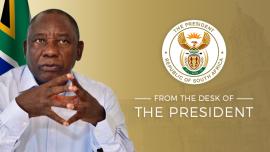
PRETORIA, Nov 11 (NNN-SANEWS) — South Africa’s President Cyril Ramaphosa says if the Group of 20 (G20) is to live up to its mission of addressing the world’s most pressing economic and financial challenges, it must “significantly and urgently reduce inequality”.
In his weekly newsletter to the nation, the President called on world leaders to act now to tackle rising inequality, warning that it poses a threat to global stability, prosperity, and democracy.
“When South Africa took over the Presidency of the G20 nearly a year ago, we identified equality as one of the pillars of our term, alongside solidarity and sustainability. We chose to focus on equality because it is essential to a more stable, prosperous and sustainable world,” the President said.
President Ramaphosa said global wealth inequality remains “stark”, noting that the world’s richest 10% account for more than half of total global income and an overwhelming 74% of global wealth.
“The human cost of these inequalities is severe: one in four people globally face moderate or severe food insecurity.
“These huge disparities are unjust and consign billions of people to poverty. Inequality is bad for everyone. It makes the world less stable; fuels conflict and undermines democracy. It stifles inclusive economic growth and prosperity,” he said.
As part of South Africa’s G20 Presidency, Ramaphosa appointed an Extraordinary Committee of Independent Experts on Global Inequality, chaired by Nobel Laureate and renowned economist Professor Joseph Stiglitz. The committee recently presented its report, which examines the causes and consequences of inequality and makes several key recommendations.
“Given the importance of equality to sustaining global growth, to social and political stability and to the legitimacy of international economic governance, it is good that at South Africa’s instance this will be the first time the G20 will focus on this matter and consider an in-depth report of this nature,” he said.
Among the report’s recommendations is the creation of a permanent international body on inequality, modelled after the Intergovernmental Panel on Climate Change (IPCC). The proposed International Panel on Inequality would measure, monitor, and report on inequality trends and advise governments and multilateral bodies on effective policy responses.
President Ramaphosa highlighted that South Africa has already implemented several measures aligned with the report’s proposals, including progressive taxation, a national minimum wage, subsidised healthcare, zero-rated essential food items, and a robust social protection system.
He added that the report identifies monopolies and anticompetitive business practices as key drivers of inequality and stresses the need to promote debt sustainability, especially for developing economies.
“Another important part of our response to inequality is to promote debt sustainability, especially for developing economies. Interest on sovereign debt repayments, particularly in Africa, is stifling public spending and economic growth. It is widening the gap between countries and within countries,” the President said.
He reiterated South Africa’s call for reform of the global financial architecture, urging multilateral development banks to adopt an “inequality-reducing agenda”.
The report also proposes that countries develop National Inequality Reduction Plans with clear goals to reduce both income and wealth disparities.
The President said that although not all the recommendations made in the report are new, what he is pleased about is that this is the first time the G20 will be considering the issue of global inequality.
“It will be critical in the lead up to the Leaders’ Summit later this month that the report is widely-read and its recommendations given proper attention in the public discourse.
“Inequality is one of the most pressing global issues of our time. This report provides a credible blueprint for the actions we need to take to overcome it,” the President said. — NNN-SANEWS



